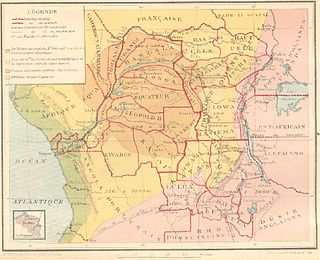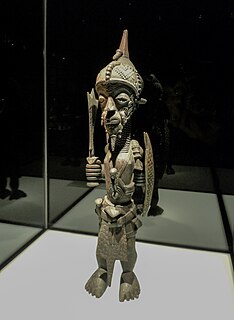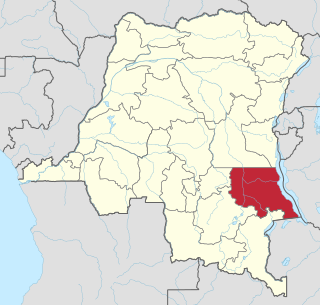Luba-Kasai, also known as Western Luba, Bena-Lulua, Ciluba/Tshiluba, Luba-Lulua or Luva, is a Bantu language of Central Africa and a national language of the Democratic Republic of the Congo, alongside Lingala, Swahili, and Kikongo.

South Kasai was an unrecognised secessionist state within the Republic of the Congo which was semi-independent between 1960 and 1962. Initially proposed as only a province, South Kasai sought full autonomy in similar circumstances to the much larger neighbouring state of Katanga, to its south, during the political turmoil arising from the independence of the Belgian Congo known as the Congo Crisis. Unlike Katanga, however, South Kasai did not explicitly declare full independence from the Republic of the Congo or reject Congolese sovereignty.

Kasaï-Oriental is one of the 21 new provinces of the Democratic Republic of the Congo created in the 2015 repartitioning. Kasaï-Oriental, Lomami, and Sankuru provinces are the result of the dismemberment of the former Kasaï-Oriental province. Kasaï-Oriental was formed from the Tshilenge district and the independently administered city of Mbuji-Mayi which retained its status as a provincial capital.

The Democratic Republic of the Congo is a multilingual country where an estimated total of 242 languages are spoken. Ethnologue lists 215 living languages. The official language, inherited from the colonial period, is French. Four indigenous languages have the status of national language: Kituba, Lingala, Swahili and Tshiluba.

The prime minister of the Democratic Republic of the Congo is the head of government of the Democratic Republic of the Congo. The Constitution of the Third Republic grants the Prime Minister a significant amount of power.

The Lunda are a Bantu ethnic group that originated in what is now the Democratic Republic of the Congo along the Kalanyi River and formed the Kingdom of Lunda in the 17th century under their ruler, Mwata Yamvo or Mwaant Yav, with their capital at Musumba. From there they spread widely through Katanga and into Eastern Angola, north-western Zambia and the Luapula valley of Zambia.
Luba-Katanga, also known as Luba-Shaba and Kiluba, is one of the two major Bantu languages spoken in the Democratic Republic of the Congo called "Luba". It is spoken mostly in the south-east area of the country by the Luba people.

Lubaland refers to the savanah grassland south of the Congo River where the Luba people live; now the southeastern portion of the Democratic Republic of the Congo. Around 1500 CE Lubas united to form a kingdom which was ultimately taken over in 1885 by Leopold II, King of Belgium, who made it part of his Congo Free State. Lubaland stretches from the Lwembe river to about 50 kilometers east of the Congo River, between 6°30′ and 10°00′ S in north-central Shaba. The area is a savanah except Upemba Depression.

The Lulua people are a Bantu ethnic group settled along the Lulua River valley in south central Kasai-Occidental province, Democratic Republic of the Congo. The Lulua are in fact a collection of small groups whose home bordered by the larger Luba state and the related Songye people and Chokwe people, with whom they share a very similar culture, history, and language.

Tshilenge District was one of the districts of former Kasai-Oriental province (1966–2015) in the Democratic Republic of the Congo. While it enclosed the city of Mbuji-Mayi, the city was administered independently. As specified under Article 2 of the country's 2006 Constitution, in 2015 the district was merged with the city of Mbuji-Mayi to form the new province Kasai Oriental. The capital of the province is Mbuji-Mayi.

Lake Kisale is a lake in the Democratic Republic of the Congo (DRC), in Bukama Territory, Haut-Lomami District. At about 300 square kilometres (120 sq mi) in area, it is the second largest of the lakes in the Upemba Depression, an extensive marshy area partly within the Upemba National Park.
The Hemba people are a Bantu ethnic group in the Democratic Republic of the Congo (DRC).
The Tumbwe people are an ethnic group living mostly in Tanganyika District of the Democratic Republic of the Congo.
The Sanga people are an ethnic group that lives mostly in the Katanga Province of the Democratic Republic of the Congo.
Zela is a minor Bantu language of the Democratic Republic of Congo. It is closely related to Luba-Katanga.

The Batwa–Luba clashes are a series of ongoing clashes in the Democratic Republic of the Congo (DRC) between the Pygmy Batwa people, and the Luba people starting in 2013.









